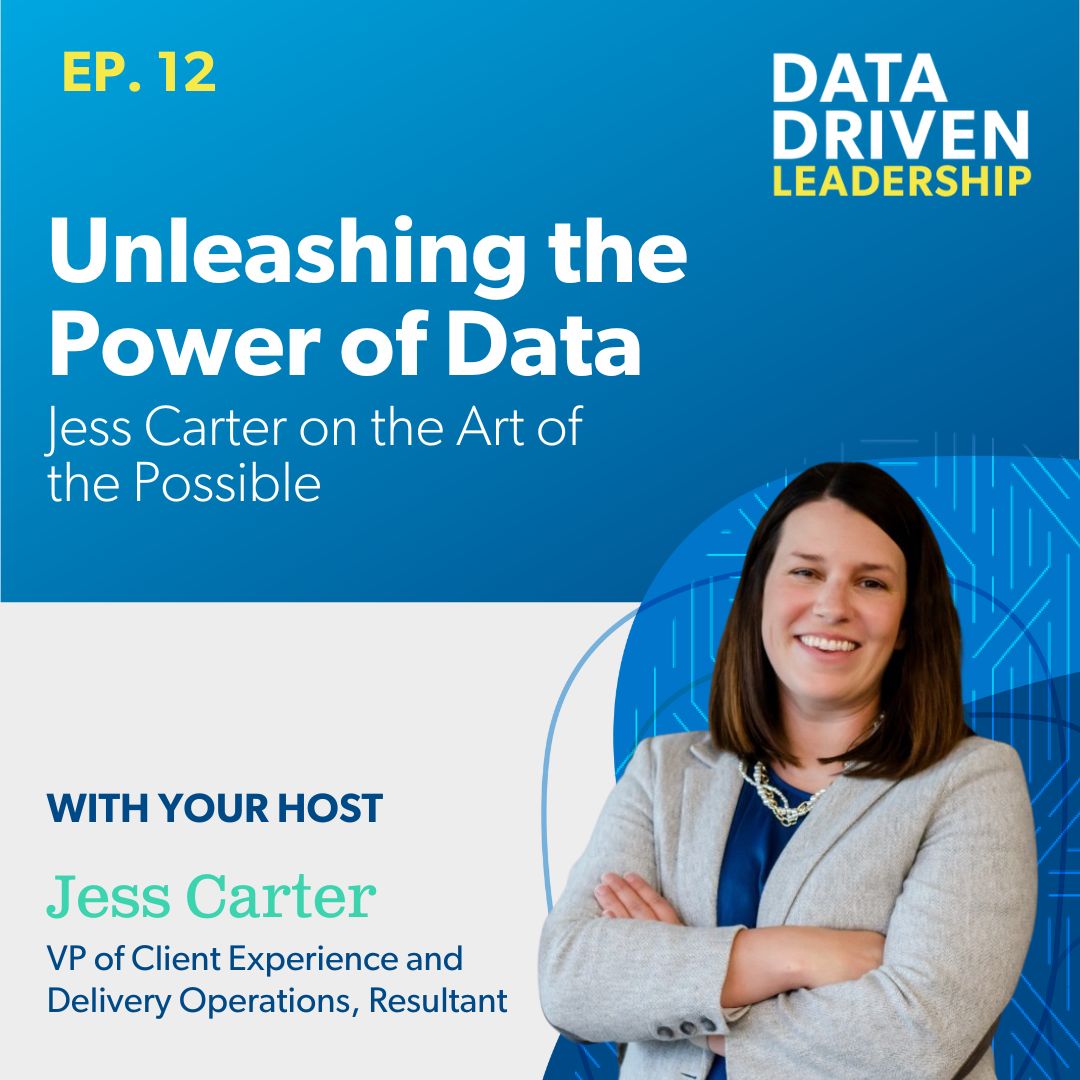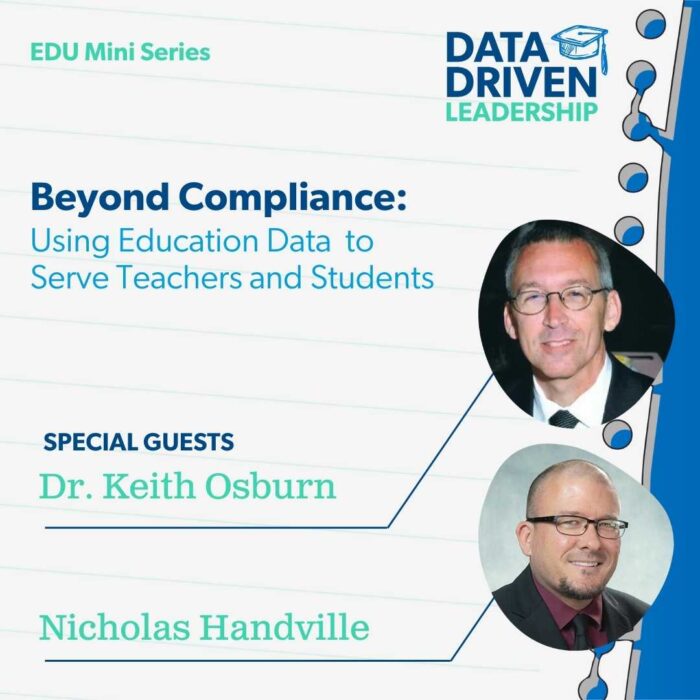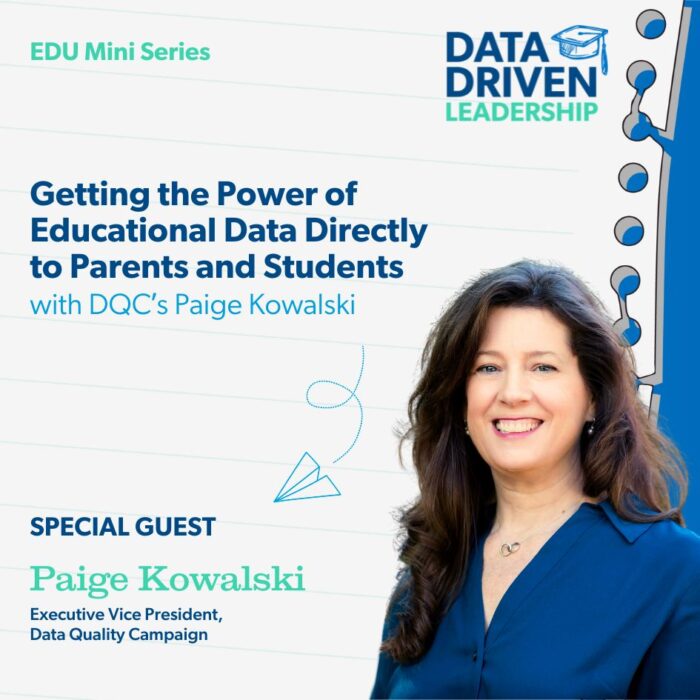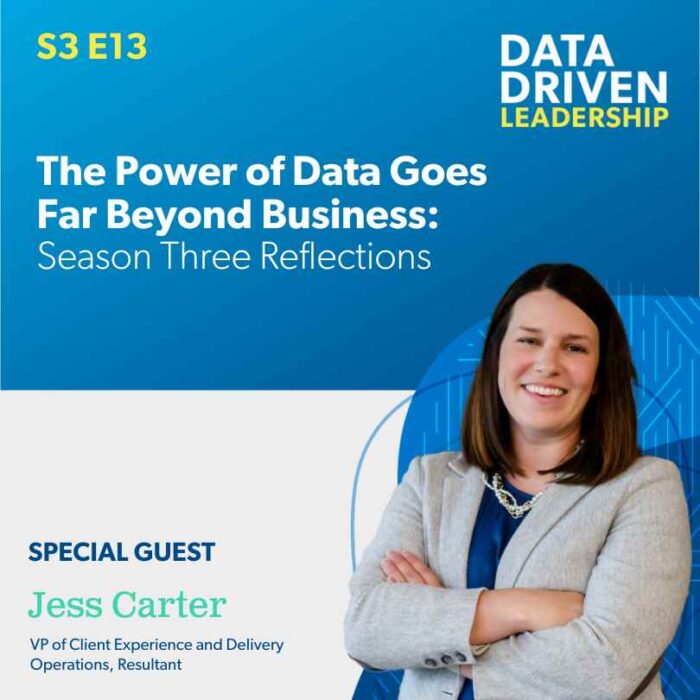
Transcript
Jess Carter: The power of data is undeniable, and unharnessed, it's nothing but chaos.
Speaker 2: The amount of data, it was crazy.
Speaker 3: Can I trust it?
Speaker 4: You will waste money.
Speaker 5: Held together with duct tape.
Speaker 6: Doomed to failure.
Jess Carter: This season, we're solving problems in real time to reveal the art of the possible. Making data your ally using it to lead with confidence and clarity, helping communities and people thrive. This is Data Driven Leadership, a show by Resultant.
Chelsea Gill: Welcome back to Data Driven Leadership. I'm not your host. For those of you avid listeners out there who don't recognize my voice, I'm Chelsea Gill, and on this episode of Data Driven Leadership, I will be interviewing your host, Jess Carter. Jess, welcome to your own podcast.
Jess Carter: What's up, Chelsea? How are you?
Chelsea Gill: I know it's a little different to be in front of the camera instead of behind the scenes. So I'm happy we're doing this. So we're taking the time today to recap season one, and now you're the one in the hot seat. So before we get started, Jess, I want to reminisce just a little bit with you. Do you remember one of the first, it wasn't arguments, it was debates that we had when starting Data Driven Leadership?
Jess Carter: No, but I'm sure you'll remind me. What was it?
Chelsea Gill: It was data versus data. Still a hot topic.
Jess Carter: I get feedback all the time and making sure I use it plural, which I for sure don't. I like to make sure that people realize that I have flaws and so I just gallivant them in front of you on the podcast.
Chelsea Gill: I think that we should ask our audience. So audience, is it, one, data, or is it, two, data? We want to know. What is it? So, Jess, you are 12 episodes in to hosting your first podcast. Tell me why you said yes to Data Driven Leadership.
Jess Carter: Well, for a lot of people who know me, I've spent nine years in state government, and so the art of success there is, I'm saying it in kind of a cavalier way, but it's keeping your clients not in the paper and so out of the limelight by just doing great citizen work. So I'm very not used to any kind of microphone in my face. I'm used to being behind the scenes, helping things look really, really good for other people's success.
I think that there's been a change for me the last few years of wanting to shake things up a little bit, try some new stuff, and get a little more comfortable with failure. Just see what I'm good at, see what I'm not good at, and be okay with that feedback. And this seemed like a... When you asked me, you kind of caught me right in the middle of realizing that, and I thought, what a great way to get some really quick feedback on whether I'm good at something.
Chelsea Gill: I think everyone will agree with me, and it's safe to say that you can check this off your box of, like, yes, I'm good at this, being a podcast host. So bravo.
Jess Carter: Good.
Chelsea Gill: Okay. All right, so season one, you've interviewed some wildly talented folks, right? What would you say have been some of your biggest lessons learned over the course of the last 11 episodes?
Jess Carter: I love that question because it's really easy to answer, and I think it's really valuable stuff. So when I think back to season one, just some quick things that pop off the top of my head. I remember the vivid picture that Michael Tantrum drew of the cycles of sales and solutioning and that he just, at some point somebody just needed some help and he walked into a room with a dry erase marker and a whiteboard, and within a handful of hours there's clarity on what everyone needed to do next. That was meaningful to me. The power of alignment and what a whiteboard and a picture can do. I think about John Roach saying, "If you don't have a data strategy written down, you do have one, but it's unintended. And so just write it down, jot down what you think yours is."
I think about Schwarz. Michael Schwarz when he was talking about the hospital work and he kind of said, As a C-level executive at a hospital walk the floor. Walk the floor, walk through the patient process, understand your client's experience with you firsthand." There are so many good, very meaningful stories that we're told, but I think it's interesting that in all of the technical expertise that our teams have, what stands out in Data Driven Leadership is like Anna Peterson who's now Anna Thomas saying, "Understand your why. If you don't know why you're trying to build something, you're going to spend cycles and extra costs trying to figure it out."
And so I just think there's a lot of what makes our team so talented and impressive to me, it is the technical stuff, but more than that, it's the strategy and the thoughtfulness and the experience that they bring to whatever problem we're trying to solve.
Chelsea Gill: I think what's interesting is that everything you just said is really a foundational, I don't want to say common sense statement, but at the same time it's just really great to have those reminders.
Jess Carter: Yeah, well, you can get stuck in years and years of doing something to do it. If somebody hasn't asked you in five years, why are we even doing that? You kind of just keep the lights on. I think we can be a breath of fresh air of asking those whys and understanding what may seem like common sense wears off over years and you normalize not asking those questions and it makes sense, but it's nice to ask them again.
Chelsea Gill: So something that I really love and admire about a great B2B podcast, is the quality of tactical information. Jess, I love to be able to listen to a podcast and leave feeling I know what to go do next. I'm sure you feel the same way. So if I'm listening now, and maybe I've listened to one or two episodes and I haven't had a chance to listen to all 11 yet, what are some of the biggest tactical takeaways as far as this is something you can go apply now in your business?
Jess Carter: So I have to do a caveat first, and it's important to me to do this because I have had some people who've listened kind of ask me this question a different way. They said like, "Okay, but what do I go do now? I've listened to the podcast. What's my call to action?" And I think it makes sense. I've even had people who are like, "Is all of this just like BI? Are you kind of just selling BI work?" And so what I've tried to explain to people is, I'm nine years into consulting and technology and I am tripping over aha moments left and right today. I've not arrived, no one's arrived. And so it is confusing to navigate this world even as someone who lives in it and breathes it all day every day. So I can only imagine a CFO that's trying to set up a warehouse is like, how much tech do I need to know just to go get the warehouse built?
And so what I would tell you is I think instead of answering some of those questions, what's my call to action? Do I go build a data strategy? Do I go chase down a warehouse? Do I need a cloud migration? What I would suggest is the podcast that we're offering to people is the ability to create lightbulb moments for you. We're going to tell the stories that are heavily entrenched in context of an industry and a client, or just an amazing story that is entrenched in context. And what we want is for those stories to create lightbulbs for your story. And so the call to action isn't like just go buy a product. And it's not to lay out this perfect suite of solutions, it's to say, "Hey, you are the most useful data tool in your company if you're listening to this."
Because what you can decide through these kinds of stories is decide what you should go do based on the kind of information we're trying to get out there.So how do you take the technology and data at your disposal in the market, your budget time and quality constraints, your industry and competitors and make the best data-driven decisions that you can today? I think that that's really important to let people know is there's never going to be a one-stop shop for everyone. If that was there, it'd be a pretty boring podcast for season two, right? That's my caveat. Is that fair?
Chelsea Gill: I think that's totally fair.
Jess Carter: Okay, so then I'm going to be real simple. The three biggest takeaways that I would hope people hear from season one is, you are qualified to try something. You don't need to wait. You don't need to wait till your next budget season or your next major initiative or the next strategy that rolls out from the governor's office.
Find something and do it. And you might have to right size that. You might have to temper your dreams into something that's a pilot or a proof of concept or a 1.0. But do something. Just try. You want a data strategy? Write something down, open up a Word document, give it a shot. No one's going to, hopefully no one's going to tell you no.
Two, do the reflection piece as you're building something small, as you're trying something new that's data driven. Stop and pause and understand, is it serving me? Is this working or not? And be willing to pivot if it's not. So I think people who are used to these long-drawn-out projects, we've talked about this throughout season one, it is okay to understand what's working for you or not and pivoting throughout a project. So I think try something and evaluate it in a cycle. Don't just wait till the very, very end.
Last thing I would say document the failures. Write them down somewhere. Not Chelsea's failures and Jess's failures, but when we decide to pivot, write down why. Because as someone who's worked at a company now for nine years and seen us from 38 people to, I don't know, like 500, there are things that didn't serve us seven years ago that actually might serve us now. And so you want to write those lessons down because you might actually want to borrow from a previous failure to iterate on a future success. And if you don't learn those lessons, you're going to have to learn them again eventually.
Chelsea Gill: Jess, that's all really great. Thank you so much for sharing your wisdom. We are so excited that you're our host. You're phenomenal. We love you. And for those of you listening, tune in to season two. We will be launching in March and there's a lot of great content coming, so I'm really excited.
If you have ideas or stories that you would like to share or something that you want to hear a solution on the spot, please write into us. You can reach us at brandatresultant.com and we will incorporate that into our future episode. So thank you all for tuning in and we cannot wait to see you for season two.
Jess Carter: Thank you guys, so, so much for listening. I'm your host, Jess Carter. Don't forget to follow the Data Driven Leadership wherever you get your podcasts. Rate and review us and let us know how these topics are transforming your business. We can't wait to see you in season two.
Insights delivered to your inbox






